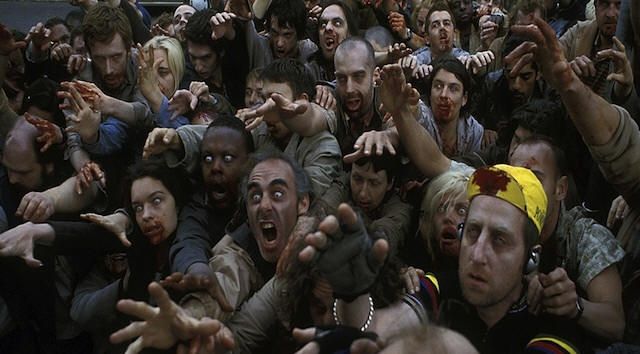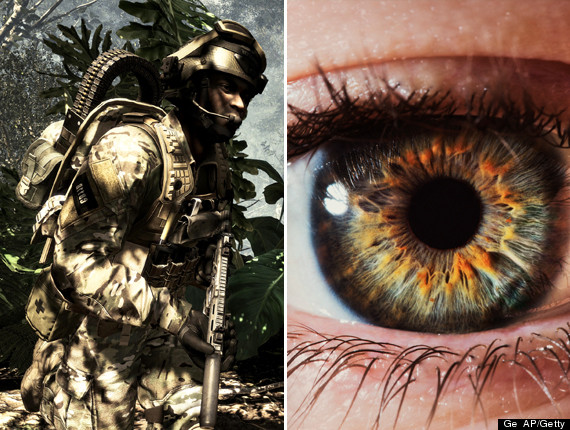We have all been there: we get home from school or work, or maybe we have a lazy weekend and all we want to do is unwind. We put on our comfortable clothing, grab a tasty beverage and a snack, sit down and turn on the console. The humming of that box as it turns on puts a smile on our face and just like that we're "in the zone." For that minute, nothing could make us happier.
Just as we're getting into our game, a sudden yet familiar phrase blasts through our the brains like asshole Superman burrowing a hole in our skulls a la Injustice Gods Among Us: "video games will rot your brain." We've all heard the age old story, about video games apparently turning our brains to mush, most likely rendering us motionless and drooling so badly someone would possibly slip and break their neck.
Hide your kids, hide your wives and hide your husbands, maybe the zombie apocalypse is much closer than we thought.
Fear not, for video games are not to blame if we become useless unproductive members of society...nope, that would be 100% our fault (yay personal responsibility). According to researchers the opposite will occur: video games actually are good for the brain. It keeps us fired up and running so smoothly people will stand in awe of our Rico-Suaveness.
Researchers started to pay attention as early as 1986 with a ground-breaking, tile-matching game called Tetris. Back in the 80's before there was Call of Duty or flat-screen televisions, life was a lot simpler: something as elementary as matching shapes took over the nation (it was pre-school all over again). The game became so addictive there were reports of people seeing those falling shapes in their sleep or on the street; walk by a car and the brain was trying to figure out which Tetris shape fit into the spaces. It became so bad, doctors coined a term for it, calling it "pharmatronic," aka the "Tetris Effect."
While doctors could have easily laughed off the whole idea, they dig some digging and noticed something positive, where the "Tetris Effect" could prevent flashbacks in people with PTSD. People with PTSD suffer from distressing re-experiencing of the trauma in the form of intrusive, image-based, sensory-perceptual memories. Basically, they see bad images in their heads and they automatically feel like they're back in that traumatic situation. Anything can set off that memory; which becomes very debilitating.
However, playing Tetris is the saving grace by competing with traumatic experiences and thereby preventing the development of traumatic flashbacks. Your mind is simply too focused on the game to go into "remember the time when" mode. The more Tetris that is played, the less the memories resurface. Tetris players had fewer flashbacks and lower scores on measures of trauma impact. This tactic is being used most recently with soldiers coming back from war as well as with children who have gone through a traumatic experience like Hurricane Katrina.
One of the many fears parents have is the belief that the younger a child starts off playing video games, the more developmentally delayed they'll become. Their tiny little brains will be so involved in video games, they will be unable to interact with others, speech will be delayed, and they'll just stay on the couch only able to communicate in X, Y, A, B terms; however, this is far from the truth.
Researchers from Deakin University in Melbourne, Australia, did a study which examined the development of 53 preschool-aged children, and found that those who played interactive games had better "object control motor skills" than those who didn't. Meaning your child will not only grow up to be normal but they'll be better than most kids, impressing teachers with their building block skills, shape matching and lack of clumsiness. Other parents will be in awe as they beg for your your secret parenting skills.
In addition to this, real-time strategy games like StarCraft, Settlers 7: Paths to a Kingdom and World of Warcraft will not only increase perceptual abilities, but also enhance their cognitive abilities. That's right, you'll be the proud parents of geniuses, for games like Starcraft can increase a player's "brain flexibility, which the scientists described as "a cornerstone of human intelligence," or helping to advance growing minds in children.
In a study conducted at Queen Mary University of London and University College London, and based on psychological tests conducted before and after, 72 volunteers played Starcraft or the life-simulation game The Sims for 40 hours over six to eight weeks. They also found that participants assigned to play the game experienced performance increases on psychological tests and completed cognitive flexibility tasks with greater speed and accuracy.
While I'm on the topic of children, did you know that video games help save children's lives...kind of. For the millions of children who suffer from a chronic and/or terrible disease, one of the ways to find comfort and even mental fortitude is through video games. Illness is hard on anyone, but especially children who may not understand why they have a certain disease.
Wanting to find a way to help children cope, the University of Utah released a study which looked at the effects of regular gaming on children diagnosed with illnesses and disorders like autism, depression, and Parkinson's disease. Kids who played certain games showed signs of improvement in "resilience, empowerment, and a 'fighting spirit.'" It is believed that games have the ability to act on "neuronal mechanisms that activate positive emotions and the reward system," which help improve kids' demeanor as they faced the daily challenges of their illnesses. Meaning, that they have a better outlook at life and have increased coping skills.
When it comes to teaching about the importance of the medications they need to take, video games and cancer go hand-in-hand. Doctors help create Re-Mission and its sequel Re-Mission 2, which is a collection of online mini-games designed to get young children, teens and young-adult cancer patients involved in understanding more about their conditions and how the body benefits from sometimes unpleasant treatments.
A 2008 study about the effectiveness of the Re-Mission idea found that, for patients from 13 to 29, sticking to a treatment regimen when managing chronic illness was a significant problem. Playing the game greatly improved treatment adherence and understanding of that treatment in that age group, according to the study. As anyone with a chronic illness or cancer can tell you, it can be highly disruptive to one's day-to-day activities, isolating, and can take away from your childhood. The games created helps give them the experience of what it's like to "be inside the body fighting cancer, using these prescriptions as weapons in their arsenal and the fight to regain a sense of control with your life."
Video games don't just provide relief from emotional pain. They can also help those who are suffering from physical pain. Psychologists at the University of Washington developed a game that helps hospital patients suffering from immense physical pain by using an age-old mental trick: distraction. The virtual reality game Snow World places patients in an arctic wonderland in which they throw an endless arsenal of snowballs at a series of targets, such as penguins and snowmen. Military hospitals found the experience helped soldiers recovering from their battlefield wounds and the soldiers who played Snow World required less pain medicine during their recuperation.
In 2012, researchers in New Zealand created a novel way to treat depressed teenagers with SPARX (Smart, Positive, Active, Realistic and X-factor thoughts), a video game designed to give therapy to kids in a way that was more fun and interactive than seeing a psychologist. The acronym stands for strategies commonly used to battle depression. The study included 168 teens with an average age of 15 that had previously sought help or struggled with depression.
Half of the group was randomly assigned to "treatment as usual,” which was usually one-on-one counseling over five sessions. The other half played SPARX, a fantasy game where the subjects created avatars in order to squash “gloomy negative automatic thoughts,” and restore order in the virtual world. Each level taught players basic facts about depression, strategies for dealing with intense negative emotions and relaxation techniques. The results for the SPARX group were extremely encouraging. About 44 percent of SPARX players recovered completely from depression while only 26 percent of the control group were no longer depressed.
Here some good news for the visually-challenged. According to a University of Rochester study, Call of Duty and Battlefield games will not only make us feel badass but will give you better vision. In a 2009 study, expert action gamers played Unreal Tournament 2004 and Call of Duty. Those playing the shooters saw a boost in their ability to detect subtle changes in the brightness of an image. It is believed the process of locating and aiming at enemies exercises gamers eyes, thus making them stronger. Since games are loaded with random A.I.s running across your screen and popping up in random places, the shooting games also helped players learn to analyze optical data on the fly.
The researchers believe their study shows the potential of video games -- particularly action games -- to serve as an aid in the way we correct bad eyesight. This may not seem like anything special, however, the ability to see random objects is the first part of our eyesight that disappears the older we become.
Still doesn't seem important? Well, if you like driving, especially at night, then it should be. Playing these games will allow people to see other cars on the highway, animals crossing in the road, or in Russia's case seeing random asteroids hitting earth; which is kind of important if you don't like getting into accidents and having to pay a higher premium. Basically not only does Geico save you money in car insurance but so does video gaming.







